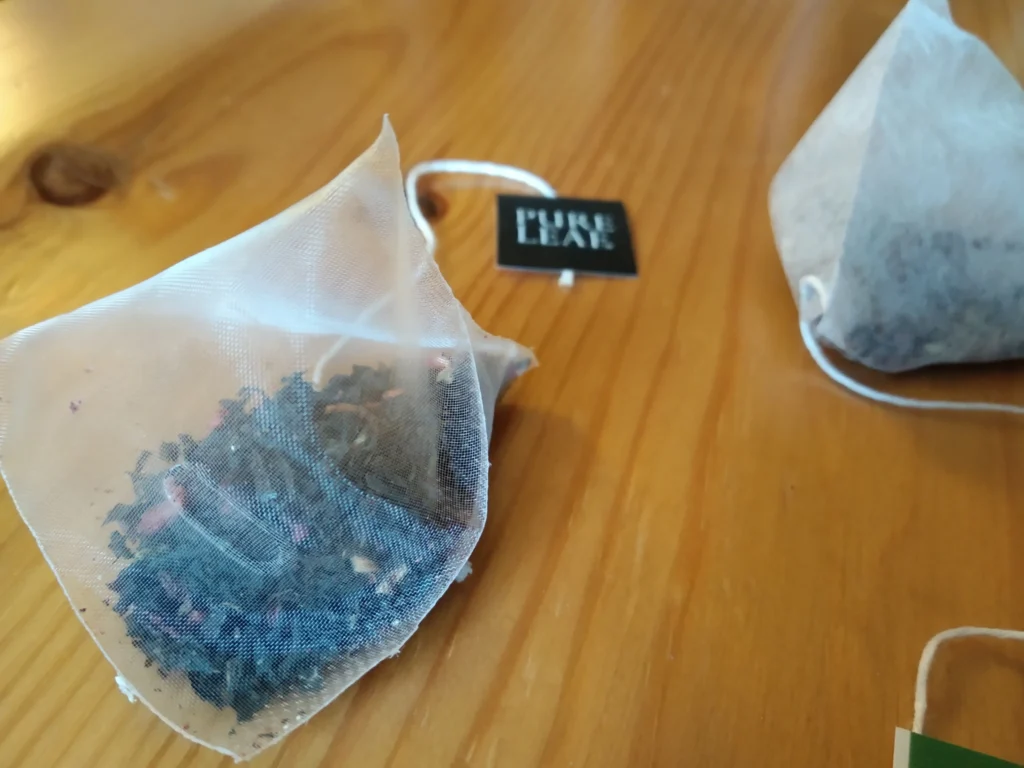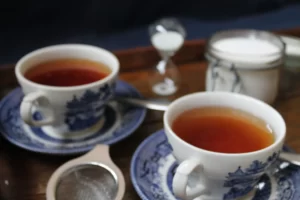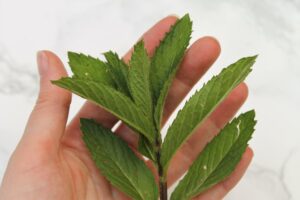You live in a world where organic certifications and high standards are expected, whether you personally care about them or not. You can’t walk into a tea aisle or visit a tea website without noticing some sort of certification or mention. Sometimes it’s a vague About page covering how workers are paid fairly, other times a tea company goes out of their way to let you know how, where and why the tea was grown a particular way.
But there’s one question I keep finding myself asking; does it really matter?
What are Organic Teas?
The answer that instantly springs to mind is teas grown without chemicals. This has numerous benefits for you and the growers. Healthy workers won’t have to deal with strong chemicals, and you can pinpoint where exactly your tea was grown, as organic growing requires small farmer-grown tea plantations rather than mass mono-crop farms. This Equal Exchange blog article covers it well.
The downside? It’s usually more expensive. Note that taste is completely irrelevant, from conventional tea to organic tea.
This is the standard definition of organic tea but as you’re about to discover further down in this article, certifying organic tea is a whole different matter.
Why I Questioned Organic Teas
I was chatting with a friend who’s in the cosmetics/health industry. She needed help proofreading her article about why a particular brand didn’t certify some of their ingredients as organic. To summarise what I felt the real point of her article was:
Sometimes you just don’t need to. Sometimes there’s no point. Let me give you an example. Here, in the UK (and many other first-world nations), we aren’t Fairtrade workers. Your employers don’t have any Fairtrade certifications to show the world that they pay you fairly.
Does that mean you’re paid unfairly? No, not really. There’s no need for a Fairtrade certification because standards across the UK mean that everyone is paid at least a fixed minimum wage.
When standards are high across the board, certifying basic things is just unneeded.
Bringing it back to organic ingredients, would you classify your home-grown veggies as organic? Despite knowing in your heart that your veggies are grown with love and without chemicals, they aren’t organic until they’ve been approved and certified… which is a lengthy and costly process.
That’s what organic really is. A certification.
Not having that certification doesn’t necessarily mean that something isn’t organic. It simply means that it’s uncertified.
With this idea in mind, I’ve decided to check out the current organic certifications to find out if they’re really necessary or just green-washing marketing hype.
What Are the Organic Requirements Anyway?

There are a few different organic labels that I see on my tea boxes. The most relevant to organic produce and the most common one that I see is the Soil Association logo. It’s that little black and white round icon in the corner of the box.
I can’t speak for USDA organic, as I rarely come across a tea box with that certification here in the UK and I’m not delving into the Fairtrade certification in this article. Fairtrade is highly important especially in the tea industry, where the vast majority of our tea comes from developing nations… but it’s not focused on the organic nature of the product so much.
I’m sticking to the Soil Association for my mini case study. I’ve been reading through the lengthy requirements to work out how much work tea companies need to put in to get the certification.
Soil Association Organic Tea Requirements
To get the Soil Association logo, companies have to meet all of the EU organic requirements and then go under further investigations. Each company is investigated once a year. Then those investigators are investigated to make sure they are investigating correctly.
I’ve been scrolling through the Soil Association requirements for about an hour. They’re pretty specific! It’s very EU-centric with extra requirements and certifications needed for products and produce that isn’t from the EU. A few tea-related things that stood out to me:
- Non-GMO packaging is essential. Those biodegradable tea sachets I’ve raved about in the past are made from a biopolymer that is made from natural sugar sources like maize and sugar beet. Apparently, these plants are often GMO. Tea brands also have to verify that cotton drawstring tea bags are made from non-GMO grown cotton. Personally, I don’t have a problem with GMO and, reading between the lines, it seems like the Soil Association is only excluding GMO derived materials because it is what consumers expect.
- Even though it’s nothing to do with organically grown tea, you can’t have forced or involuntary labour or child labour that interferes with their education. I was pleasantly surprised to find this in the document.
- You can still get an organic certification if only 95% of ingredients are organic. Then you have to clearly show which ingredients aren’t organic on the label.
- Tea bag paper must be bleach-free.
- Gooseberries, passion fruit, dried raspberries, dried red currants, and safflower petals can all be used in the non-organic form because apparently, the EU considers these ingredients to not be available in organic form. To meet the Soil Association standards, you do need to find gooseberries (not the others, for some reason) as organic as they believe this EU rule is outdated.
- Only organic flavourings are allowed. Did you know that solvents used in natural flavourings such as acetone and hexane can be derived from fossil fuels? As long as the primary flavour (e.g. strawberry) is natural, you can call it natural flavouring. So, the Soil Association rules that “natural flavourings used in organic products should only be allowed if they have been made using solvents that would be permitted under organic standards.”
This is a bit of an eye-opener. I wasn’t expecting the requirements to be so strict and extensive. It’s not just enough to grow organic tea. Every aspect of the business from transport to storage, growing, fertilising and processing is carefully inspected with a fine-tooth comb. I’ve simply highlighted a few that are especially important for tea companies.
So, What Does That Mean?
To put it simply, if a tea company has a Soil Association certification it means that they have gone to a LOT of trouble to get it. It’s not something they can add to the box as an afterthought.
Whether organic produce is the norm for the ingredients needed to make a tea or herbal blend or not, it doesn’t seem to matter. The organic certification covers so much more and is most definitely needed. It covers aspects that you wouldn’t even think about, outside of the paper tea bag. It’s not just about organic ingredients.
On the one hand, that’s excellent. It means that the organic certification really means something and isn’t just a marketing ploy.
On the other hand… it’s kind of proving my point. For many tea companies, adhering to these strict rules is a lot of work. Even if their tea leaves are organic, they might not have the correct packaging, resources or ability to prove to the Soil Association that they’ve met the high standards.
This applies to small companies and start-ups who might not be able to pay the fees (it’s not a free certification!) and to large corporate tea companies that have such complex processes, systems and sources from all over the world. Letting the Soil Association assess all their business, growers, partners, etc. would take a lot of money and effort that might not result in a profit increase.
The Answer to Organic Tea

Yes, if you see tea with an organic certification you shouldn’t hesitate to buy it. But you shouldn’t hesitate about uncertified teas either.
After my research, I still stand by my original theory that uncertified teas aren’t necessarily unorganic. It completely makes sense that organic tea companies might not be certified given the high standards that are not easily met.
Nonetheless, when I see a tea company that does have the Soil Association logo I now have a new sense of respect for that brand. It’s clear to me that adhering to the Soil Association regulations means farming and conducting business in an environmentally conscious way. It affects all aspects of the company, changing how they work from the foundation upwards.
Tea Companies with Soil Association Certifications
I’ve done some digging and here are a few of the most well-known tea brands that are certified with the Soil Association:
- English Tea Shop (license number DC21316) – read my reviews of their tea.
- Pukka Herbs (license number DJ08357) – read my reviews of their tea.
- Teapigs (license number DC23308)
- YOGI Tea (license number DS16893)
Organically grown tea is important, but non-organic tea isn’t automatically evil. Take a look at Ahmad Tea London’s charity work, for example. They have no organic certification or even mention of organic processes on their website, but they’ve built hospitals, donate funds to charity and are dedicated to sustainable sourcing.
That’s just one example.
If you are concerned about organic teas, take a moment to read the About page and contact customer service. If there’s a detailed story about the small farm where the tea is grown, chances are you’ll be happy that the right care and attention are being made to ensure sustainability and organic practices. If customer service gets back to you with a generic lawyer-approved statement that doesn’t really mean anything, then best to avoid them.
I’ve reviewed many teas for the Izzy’s Corner blog (I’m Izzy, by the way) including a delicious OneCertAsia organic certified Assam tea from What-Cha. It’s grown by the Nath family in the Sonitpur district of Assam, India. If you’re looking for an organic tea from a company that really supports the hard workers that grow it, check that out!





